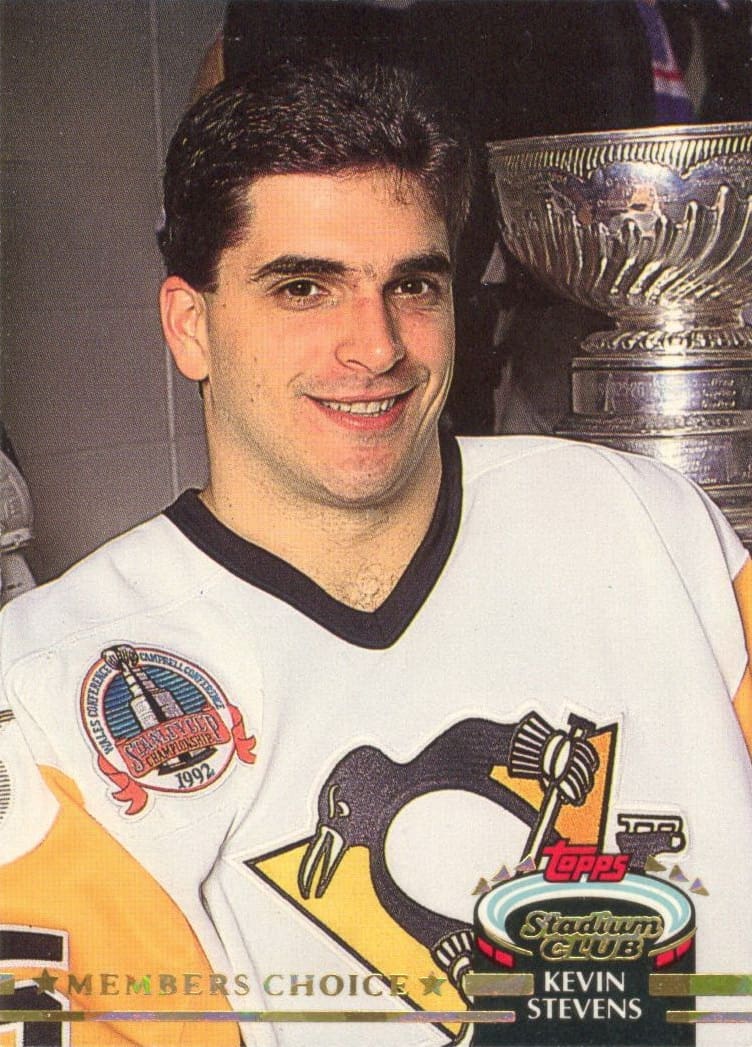Penguins History
On Kevin Stevens, Addiction and Some Hope

Kevin Stevens is the first addict I have known personally.
Even given the social distance between an athlete and a sports writer, I have at times gone through some of the emotions those who know an addict experience – sympathy, confusion, hope, exasperation and the gnawing fear of news one day that the addiction would claim the ultimate victory.
The most encouraging sign that the former Penguins star left winger might have finally gotten the upper hand came over the weekend, when Canadian network Sportsnet published an extensive story and video documentary about Stevens.
That piece has plainly been in the works for some time, with Stevens’ full cooperation.
Even Mario Lemieux sat down for an interview, along with Mark Recchi, Rick Tocchet and other former teammates of Stevens, who became known as “Artie” after his father. He helped define “power forward” in the NHL and was a key component of the 1991 and ’92 Stanley Cup teams.
Those people, and lots of others, have done what they could to help Stevens, 52, whose problems began with the horrific facial injury he sustained during a playoff game in 1993. After that, pain killers and opioids took over and eventually stripped him of so much.
When the Penguins had a celebration at the final regular-season home game at the old arena April 8, 2010, and invited back former players from all eras, Stevens’ absence was noticeable. The official explanation was a personal conflict, but those of us in the press box who knew Stevens talked about our concern for him.
Rock Bottom
Stevens apparently finally hit rock bottom and got scared straight in spring 2016 when he got busted by the FBI and faced federal charges. He was lucky to get a fine and probation, rather than prison time, with instructions to talk to students and others about addiction. He also got rehired as a Penguins scout.
It is impossible if you have spent any time in the same room with Stevens, not to like the guy with the big frame, the bigger personality, the booming voice and the Boston accent.
That goes double for those of us who knew him before the addiction, regardless of the context of that contact. He is just, at his core, a great guy.
As a young reporter, I sat by myself one day in the old Civic Arena waiting for Penguins practice to start. Down the runway came Stevens, who took a short skate by himself.
As Stevens came off the ice, he was so giddy he had to share his excitement with someone, anyone. So he stopped to talk.
This was his first time on the ice since something new and revolutionary at the time – arthroscopic knee surgery. He couldn’t believe how quick the recovery was.
Another sports writer once drove to Penguins practice in the fog and left his headlights on, leading to a dead battery. He was walking back toward the old arena with jumper cables in hand when Stevens walked out. Without hesitation, Stevens drove over to give the guy a jump.
In the locker room, Stevens was funny but also brutally honest when it came to how things were going with the Penguins.
Over and above his contributions to two Cup teams, he injected himself into Penguins lore when he boldly and correctly predicted the club would come back from an 0-2 deficit to beat Boston in the 1991 conference finals.
What Could Have Been
Stevens might very well have had a Hall of Fame career, as did several of his Penguins teammates, if not for his addiction.
He spent stints in rehab and the NHL’s substance abuse program, but nothing stuck until that 2016 arrest.
In 2015, months before that, I did a phone interview with Stevens for another publication. Part of the assignment was to talk to him about taking the college route (Boston College).
The other part was to see if he would talk about his addiction.
Stevens didn’t get angry or defensive.
He said he didn’t want to get too detailed because he didn’t know how much his kids knew. That seemed logical, but it also didn’t seem wholly believable, because, you know, the internet.
He told me, “Everything’s good now. I’m just taking it a day at a time, just trying to be the person I want to be. It’s tough. No, not tough. It just is what it is, day to day. Everybody has things that they deal with. It’s not going to kill me.”
My editors deleted that last part, for whatever reason. At the time, I took solace in his declaration that he had no intention of dying, but then I wondered who he was trying to convince.
It later became clear that Stevens was still in the grips at the time of our interview, still using. He wasn’t ready to open up.
He’s sober now. Anyone who has ever known him hopes that lasts.
Hang in there, Artie.













